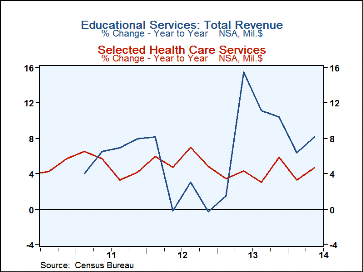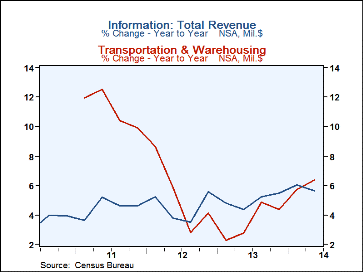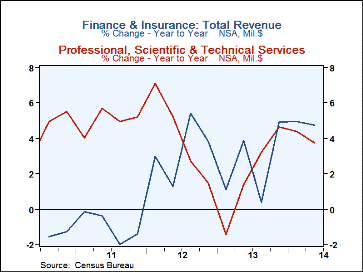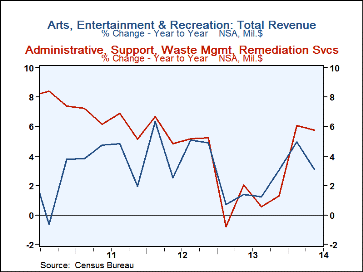 Global| Sep 11 2014
Global| Sep 11 2014U.S. Quarterly Service Survey (QSS) Indicates Revenue Rebounding
by:Tom Moeller
|in:Economy in Brief
Summary
The Quarterly Service Sector Survey, produced by the U.S. Census Bureau, is designed to give timely, detailed indications of activity in the service sector. These indicators feed into estimates of GDP. The latest figures covering [...]
The Quarterly Service Sector Survey, produced by the U.S. Census Bureau, is designed to give timely, detailed indications of activity in the service sector. These indicators feed into estimates of GDP.
The latest figures covering activity in the health care industry indicated a 2.5% recovery (4.6% y/y) in revenues last quarter following a 0.9% Q1 decline. The preliminary Q2 estimate with last month's GDP report indicated a lesser 0.6% rise in health care activity. The QSS figures, however, cover just part of the estimates in the GDP accounts so a difference of this degree is usual. The direction of change, if not the magnitude, will correspond with one another. As an aside, overall health care revenues account for 25% of service sector activity and 11% of overall GDP.
Most other industries also showed improvement in Q2 activity, although much of the gain probably was due to seasonal influences not evident in health care. The greatest swing in activity was in the Arts, Entertainment & Recreation industries where revenues gained 12.1% (3.1% y/y) versus a Q1 decline of 8.2%. Nevertheless, this rise was the weakest Q2 increase of the last six years. Showing great strength was the Educational sector where the 12.9% revenue gain (8.1% y/y) was a record. It was led by strength in Support Services.
Showing single-digit growth of 8.7% (6.4% y/y) versus Q1 was the Transportation & Warehousing sector where huge increases in revenues from air and truck transportation led the growth. That was followed by the Administration & Support industries where 6.2% quarterly growth (5.8% y/y) in revenues was paced by a 10.9% gain (0.6% y/y) in travel arrangements. Professional, Scientific & Technical industries demonstrated 4.1% growth (3.7% y/y) versus Q1 led by growth in architectural & related services as well as management & scientific, advertising and legal services. The 2.0% gain (5.6% y/y) in Information revenues was held back by a 5.4% decline (+3.9% y/y) in motion picture/sound recording revenues. To the upside by 7.2% (8.0% y/y) were publishing revenues.
Showing a negligible 0.6% revenue gain (4.8% y/y) was the Finance & Insurance industry led by a slight decline in insurance carriers' revenue. To the downside was Utilities revenue where natural gas distribution fell by one-half q/q (+10.0% y/y). Electric power distribution revenues also were down 6.4% (+6.6% y/y) from Q1.
Data on the QSS are available in Haver's USECON database.
| Quarterly Service Survey - Total Revenue (%, NSA) | Q2 '14 | Q1 '14 | Q4 '13 | Y/Y | 2013 | 2012 | 2011 |
|---|---|---|---|---|---|---|---|
| Health Care | 2.5 | -0.9 | 4.0 | 4.6 | 4.2 | 5.6 | 4.9 |
| Arts, Entertainment & Recreation | 12.1 | -8.2 | -4.5 | 3.1 | 1.6 | 4.6 | 3.9 |
| Educational | 12.9 | 1.8 | -2.1 | 8.1 | 9.6 | 2.6 | 6.4 |
| Transportation & Warehousing | 8.7 | -2.9 | -0.8 | 6.4 | 3.6 | 5.3 | 11.2 |
| Administrative & Support & Waste Management & Remediation | 6.2 | -1.6 | 0.1 | 5.8 | 0.8 | 5.5 | 6.3 |
| Professional, Scientific & Technical | 4.1 | -3.4 | 4.4 | 3.7 | 2.0 | 4.1 | 5.0 |
| Information | 2.0 | -4.6 | 8.1 | 5.6 | 5.0 | 4.5 | 4.5 |
| Finance & Insurance | 0.6 | 1.5 | 3.7 | 4.8 | 2.6 | 3.4 | -1.0 |
| Utilities | -17.4 | 21.3 | -5.8 | 7.1 | 7.0 | -4.1 | 2.9 |
Tom Moeller
AuthorMore in Author Profile »Prior to joining Haver Analytics in 2000, Mr. Moeller worked as the Economist at Chancellor Capital Management from 1985 to 1999. There, he developed comprehensive economic forecasts and interpreted economic data for equity and fixed income portfolio managers. Also at Chancellor, Mr. Moeller worked as an equity analyst and was responsible for researching and rating companies in the economically sensitive automobile and housing industries for investment in Chancellor’s equity portfolio. Prior to joining Chancellor, Mr. Moeller was an Economist at Citibank from 1979 to 1984. He also analyzed pricing behavior in the metals industry for the Council on Wage and Price Stability in Washington, D.C. In 1999, Mr. Moeller received the award for most accurate forecast from the Forecasters' Club of New York. From 1990 to 1992 he was President of the New York Association for Business Economists. Mr. Moeller earned an M.B.A. in Finance from Fordham University, where he graduated in 1987. He holds a Bachelor of Arts in Economics from George Washington University.










